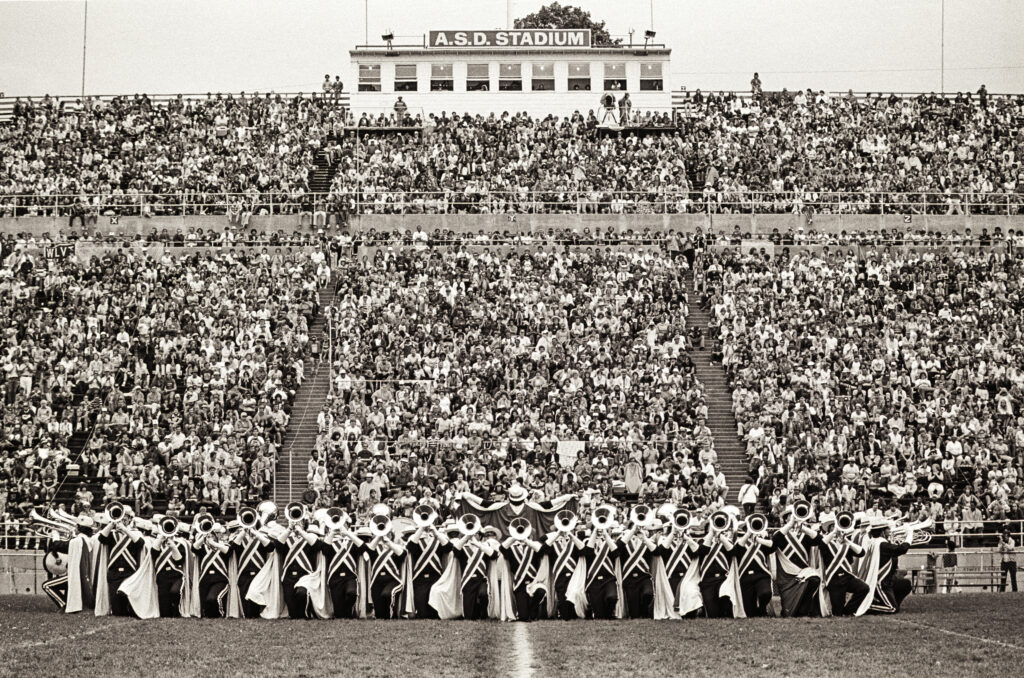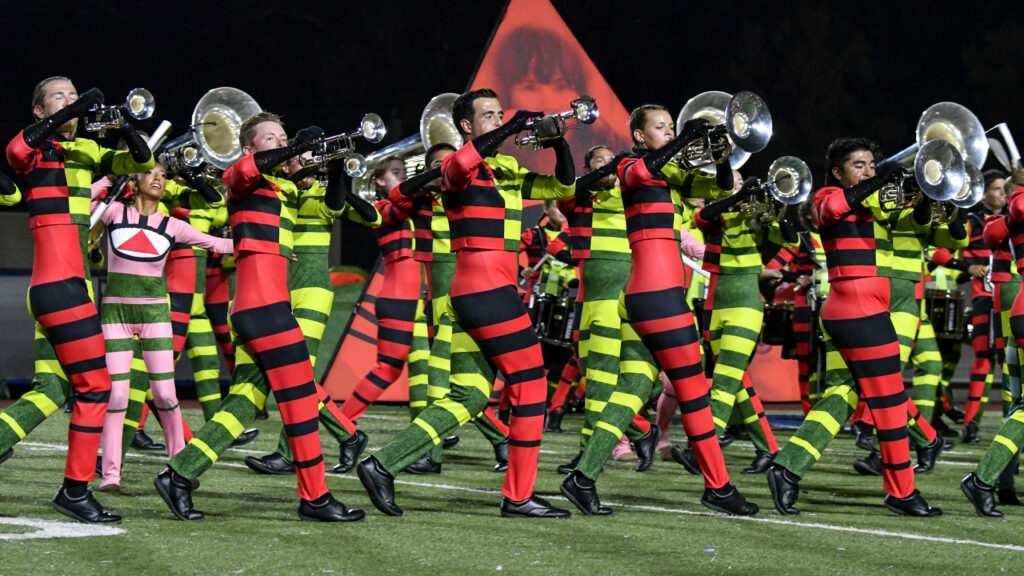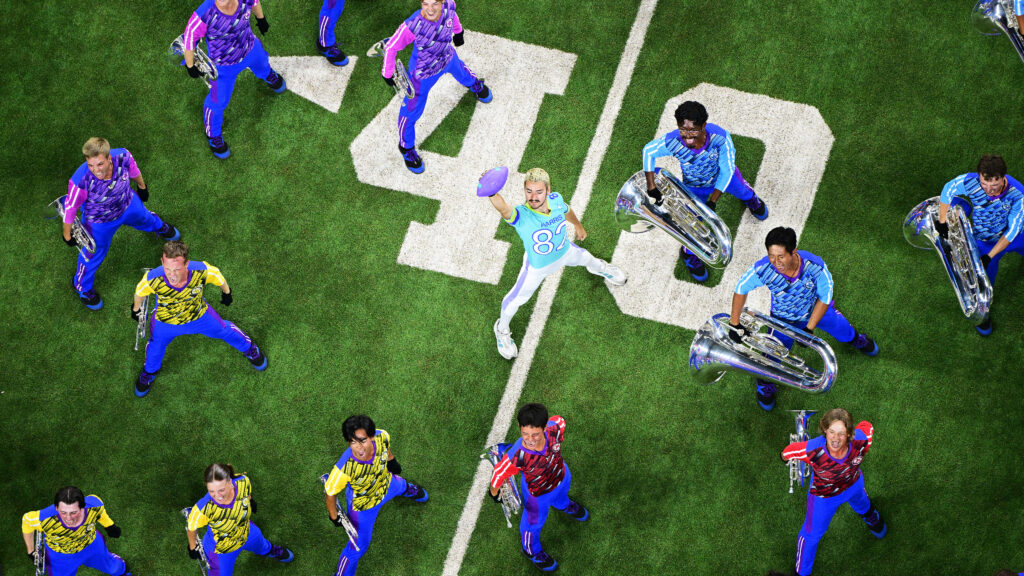By Marco Buscaglia My son’s recent 8th birthday made me think about drum corps. Although a group of15 or so behaviorally challenged boys crowding me for pizza and juice boxes has little to do with horns and rifles, I had the onset of one of those unnecessarily sentimental moments as a parent when you see your children growing up right before your eyes. In this case, it was the act of watching my son having a great time with his friends. His parents were the furthest things from his mind. Not that it’s wrong, it’s natural. Any parent can tell you that the four-year-old stapled to your pantleg fast-balling you questions on clouds, broken windows and dead grandmothers eventually grows up into a son or daughter with his or her own life. And if things go well, meaning you only occasionally throw a Gameboy out a moving-car window, force your son to cut your neighbor’s lawn or decide to wear your “I’m with Stupid” tie to your little girl’s father-daughter dance, you can be a part of that life (go ahead, insert Harry Chapin song here). But at some point, the umbilical cord gets cut. Drum corps helps cut that cord. After all, it takes a leap of faith for some parents to let their 16-year-old son or daughter ride a bus and sleep in a gym all summer. Marching drum corps makes one independent. It helps someone stand on his or her own. But what if that umbilical cord gets cut — or at least partially severed — when you’re still a kid — a little kid? I went to my first drum corps rehearsal when I was 8. Luckily, the manager of the Cavalier Cadets at the time, Adolph De Grauwe, told my dad I wasn’t ready. Who knows, maybe it was my red, swollen-shut eyes and tear-drenched shirt that gave me away. After all, I was the type of kid who cried when my mom left me at the kitchen table so she could bring a load of laundry downstairs. And my father thought I could actually spend two nights a week away from my family practicing with the corps? Not to mention the weekend trips and one-week tour? Was he kidding? Not the next year. At the ripe old age of 9, I joined the Cavalier Cadets as a member of the color guard, where most rookie members started their drum corps experience. There were plenty of boys in the section my age — and a couple who already had been marching a year or two. So there I was, in the fall of 1977, at Lincoln Jr. High School in Park Ridge, Ill., with a six-foot flagpole in my hand, fighting back the tears. My dad, who told me he’d sit and watch rehearsal, was undoubtedly en route to the first Italian beef stand he could find. But I survived that first practice, and the next and the next. When the summer of ’78 began, I was a right-side-drop contributing member of the color guard. Cadet corps in the Midwest were thriving in the late 1970s and early 1980s. The Madison Jr. Scouts dominated the scene throughout the ’70s, piling up win after win, most of them in double-digits. The Kiltie Kadets were always competitive, as were we, the “Little Green.” The Phantom Regiment Cadets experienced a huge increase in members in the early 1980s, and went on to dominate the cadet corps circuit for years. Shows, which usually took place in the afternoon before the A corps’ night show, included corps like the Wausau Pages, feeder corps to the Wausau Story; the Guardsmen Cadets, feeder corps to the Guardsmen; the Imperial Cadets, feeder corps to the Imperials; the Colt Cadets, feeder corps to the Colts; New Dawn, feeder corps to New Day; Los Charos, feeder corps to the Vaqueros; and others. The cadet corps were the exhibition corps at the home show in the evening, later piling into the stands to yell their support as they watched their proverbial big brothers and sisters perform. That support was always reciprocated. It was always a thrill to hear the A corps’ shout of “Go go little brothers” when we were at the same shows. It made me aspire to the next level. I can’t speak for other cadet corps but the Cavalier Cadets were something like a cross between summer day camp and a “Bad News Bears” movie. We were obnoxious bundles of energy who sprinkled enough four-letter words into our vocabulary to make a truck driver blush. We rode to rehearsals with our parents a couple of nights a week, where we learned how to blow into the right end of our horns or bang away on a drum. On weekends — and if we were lucky, during a week in July or August — we saw cities and states we only read in Major League Baseball and National Football League standings. Our youth served as both the basis for our friendships and our enthusiasm for the activity. We caught the drum corps bug at an early age. Some opted out of corps after a couple of years, favoring high school football and summer jobs. But some of us stuck around for more than a decade. In the Midwest, the strong cadet corps of my era had a huge impact on their older counterparts later in the decade. The Madison Scouts, the Phantom Regiment and the Cavaliers all benefited from their feeder corps throughout the 1980s. And that was the point. We were preparing for the A corps. That’s the main reason feeder corps were formed in the first place. At no time was this lesson driven home to me more than in 1981, when the Cavalier Cadets won Cadet Corps International. One of our instructors at the time, Bill Koch, a Madison Scout alum, told us all season long not to get too wrapped up in the CCI championships. And to unknowingly prove his point, he went on a fishing trip during Labor Day weekend instead of attending our final show in Elk Grove, Ill., where we won the title. It didn’t even bother us, knowing that by helping us learn to march and play, he had already done his job. I can’t imagine my son getting on a bus for a weekend trip to Appleton, Wis., or Dubuque, Iowa, at his age. But who knows? It’s been almost 20 years since there was a strong cadet corps circuit in the Midwest. And special credit must be given to the organizations that still field feeder corps. The fact that mine isn’t around is actually kind of depressing now that I have children of my own. But there’s still plenty to do — baseball, soccer, music lessons, family vacations and more. And if my kids want to march drum corps when they’re older, that’s great. If not, I’ll be more than happy to support them in any activity that would advance their education, broaden their perceptions and create a platform for making lifelong friends. And if they learn how to swear at an early age — well, that will have to just come from me. A Mascot proposal Corps thrive thanks to members cut from different cloth Leaf it to Canada to break the monotony of tour Aging out isn’t worth the weight The ABCs of drum corps fans Show concept promises all-out KISS and tell Marco Buscaglia marched in the Cavaliers from 1984-1989 and the Cavalier Cadets from 1978-1983. He currently is an editor with Tribune Media Services in Chicago. Marco can be reached via e-mail at [email protected].
- Marching Music's Major LeagueTM





